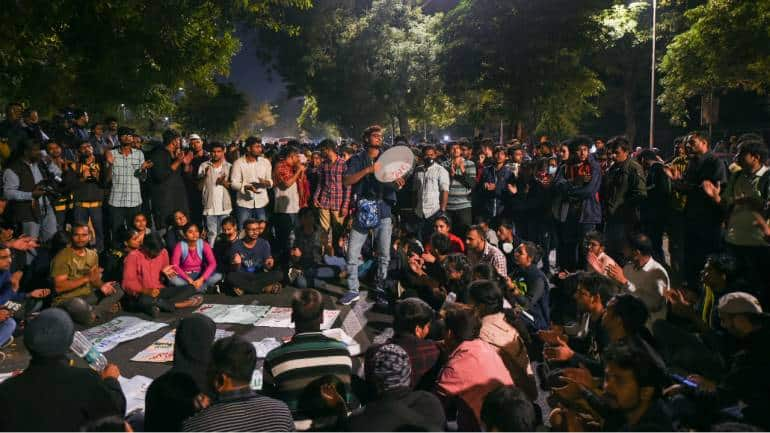
In-Depth | Unbowed, Unbent, Unbroken: An anatomy of JNU students’ protest against fee hike

In-Depth | Unbowed, Unbent, Unbroken: An anatomy of JNU students’ protest against fee hike
Jawaharlal Nehru University (JNU), considered one of India’s top educational institutions, has found itself in the midst of a battle yet again.
The public university, established by an act of Parliament in 1966, is alma mater to some of India’s brightest minds as well as people in power. These include Union Ministers Nirmala Sitharaman and Subrahmanyam Jaishankar, NITI Aayog CEO Amitabh Kant, senior journalist and Ramon Magsaysay laureate Palagummi Sainath, Communist Party of India (Marxist) General Secretary Sitaram Yechury and the 2019 Nobel laureate in Economics, Abhijit Banerjee.
Yet, in the last few years, JNU has been in the news more because of protests and demonstrations. One such incident, the 2016 JNU sedition row, is still fresh in people’s minds.
Many see a large number of JNU students as having an ideological leaning that is in complete contrast to that of the political party in power at the Centre. Many within JNU also see the institute as the last surviving bastion of liberalism, resisting a central government led by a right-wing party.
In the last few days, the university highly regarded for its social science courses, has been the subject of intense public scrutiny. The latest issue is about the confrontation between JNU students and the university’s administration over a proposed hotel fee hike.
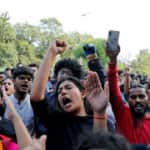
On November 11, hundreds of JNU students, mainly led by the JNU Students’ Union (JNUSU), protested near their campus against what they claimed was the administration’s “anti-student” policy. JNUSU is currently presided by Left-affiliated student bodies led by Students’ Federation of India (SFI).
They wanted to meet Vice Chancellor Mamidala Jagadesh Kumar and demand withdrawal of the draft hostel manual, which they claim had provisions for fee hike, dress code and curfew timings.
Students claim that around 40 percent of them come from lower-income group families and they will not be able to afford the fees following the hike.
In a statement, the university Registrar had said JNU incurs charges of Rs 10 crore per annum on water, electricity and service charges, which it has been paying from general funds received from University Grants Commission (UGC).
Breaking blockades and raising ‘no convocation without affordable education’ slogans, the students marched towards the All India Council for Technical Education (AICTE) auditorium, where Vice President M Venkaiah Naidu was addressing a convocation. Some of them were detained.
Union Human Resource Development (HRD) Minister Ramesh Pokhriyal, who was not able to exit the venue for a long time, met these students and assured them that a dialogue will be initiated.
On November 13, JNU administration announced a partial rollback of the hostel fee hike.
#JNU Executive Committee announces major roll-back in the hostel fee and other stipulations. Also proposes a scheme for economic assistance to the EWS students. Time to get back to classes. @HRDMinistry— R. Subrahmanyam (@subrahyd) November 13, 2019
While some reports suggested that provisions to implement a dress code and curfew timings had also been withdrawn, JNUSU President N Sai Balaji claimed that the 11.00 pm restriction, closure of 24x7 library reading rooms, imposition of dress code and “dangerous punishments like rustication, withdrawal of degree”, among others, remain.
“More importantly, the principle of 10 percent fee hike every year remains,” Balaji added.
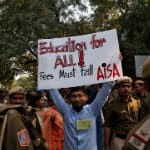
Earlier, the hostel fee was hiked from Rs 20 per month to Rs 600 per month for single occupancy rooms and from Rs 10 per month to Rs 300 per month for double occupancy rooms. An additional service charge of Rs 1,700 per month and a caution deposit of Rs 5,500 were also added. Students were not required to pay the service charge earlier.
The rollback, or revised version, changed these prices to Rs 200 per month for single occupancy rooms and Rs 100 for double. The caution deposit and service charges will continue to be charged at Rs 5,500 and Rs 1,700, respectively.
However, this was not accepted by students who said the fee amount was being revised only for those belonging to the below poverty line (BPL) category and that it included riders.
While the service charge of Rs 1,700 per month remains unchanged, the revision said eligible BPL students would have to pay only 50 percent of it. Additionally, the administration said it would introduce schemes to assist students from Economically Weaker Sections (EWS).
Qasim Masumi, JNUSU Councillor, told Moneycontrol that the fee hike was unacceptable. “Besides the basic hostel rent, service and utility charges are also being added. Salaries of mess workers and hostel staff are also being taken from us. This adds up to an increase of Rs 7,000 extra per month for each student. This hike is not acceptable and is being forced upon us,” Masumi said.
“JNU is being targeted because of what we stand for. Their idea is to privatise the education system. This is also because we stood up against the (draft) National Education Policy (NEP),” Masumi added.
Calling the rollback an “eye wash”, students allegedly painted graffiti for the Vice Chancellor inside the administration block, which they had been occupying while demanding a complete rollback.
Objectionable messages, mostly directed towards right-wing groups, were also found written on the base of yet-to-be-unveiled Swami Vivekananda statue inside the campus.
Days later, a First Information Report (FIR) was filed against unidentified persons in connection with the “vandalism”.
The Union Ministry of Human Resource Development (HRD) set up a three-member committee to recommend ways to restore normalcy in the university’s functioning and initiate dialogue with the students and administration.
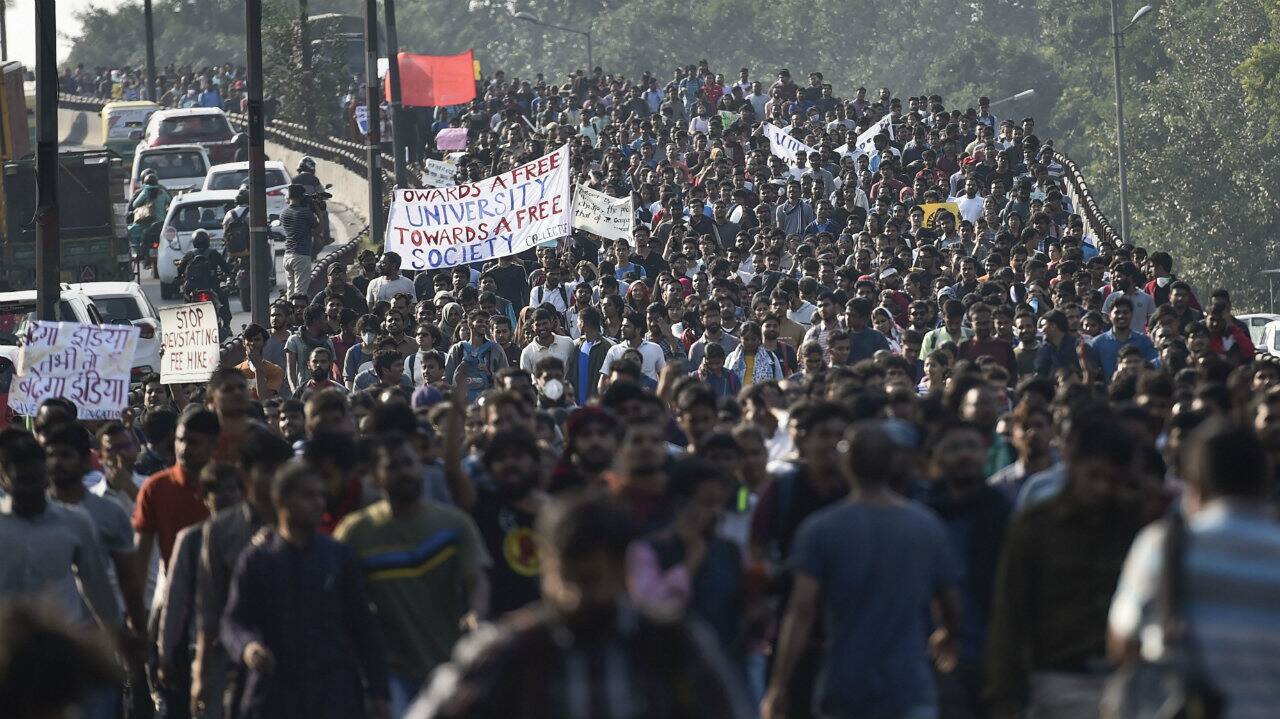
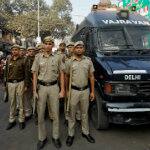
The demonstration took a more serious turn on November 18 when thousands of students marched towards Parliament, protesting against the hike. JNU students were joined by others from different universities across the country. This coincided with the first day of Parliament’s Winter Session.
Delhi Police deployed hundreds of personnel on the streets of the national capital to block JNU students from moving forward. The ensuing tussle between students and the police outside the Safdarjung tomb near Jor Bagh paralysed traffic, bringing the national capital to a halt. Metro services were also affected.
Students allege that street lights were turned off and they were lathi charged by police. They also allege that women were groped and manhandled, and even physically challenged protesters were not spared.
Some students took to Twitter to share pictures of the march and of the injuries they received had allegedly during the lathi-charge. The hashtag "EmergencyinJNU" trended on the social media platform.
Delhi Police’s top police officials denied having used any force.
According to the police, around 30 police personnel and 15 students were injured during the protest. The police also detained about 100 protesters, including JNUSU president Aishe Ghosh, Secretary Satish Chandra Yadav and former JNUSU president N Sai Balaji.
The police filed two FIRs -- for rioting, armed with deadly weapon; for voluntarily causing hurt to deter public servant from his duty and for unlawful assembly, among other sections.
JNUSU has demanded that all charges against student protesters be dropped. However, they had not received any written response from police by the time this story was published.
A day later, JNU approached the Delhi High Court seeking contempt action against its students and the Delhi Police. JNU claimed that students had grossly violated the High Court’s August 2017, order by holding a protest within 100 metres of the administrative block.
It also said that the police had violated the Court’s order by refusing and failing to take action to maintain law and order in the campus and removing the blockade around the administrative block.
Opposition parties were also quick to corner the Centre over the protest. Describing police’s lathi-charge as "suppression of voice", members sought suspension of parliamentary proceedings in favour of a debate on the issue.
Congress’ TN Prathapan said that the government “is undemocratically suppressing their (students’) voice against fee hike” and is “ruining higher education institutions".

A day ahead of the students’ protest march to Parliament, JNU teachers had said that the administration was open to dialogue with elected hostel representatives but not with the “non-notified” students’ union.
However, the JNU Teachers' Association (JNUTA) expressed concern over deployment of police outside the campus.
It also said that measures or “use of force to thwart the exercise of constitutionally guaranteed democratic rights and to impede the students from peacefully taking their voice beyond the campus would be extremely unfortunate”.
JNUTA held a peace march inside the campus on November 19 in students’ support and against "police brutality".
The Akhil Bharatiya Vidyarthi Parishad (ABVP), a right-wing students’ organisation affiliated to the Rashtriya Swayamsevak Sangh (RSS), initially supported JNUSU’s protest. However, on November 19, it withdrew support citing JNUSU’s handling of the issue and that its backing was not recognised.
ABVP also condemned the manner in which Delhi Police "placed barricades and manhandled peacefully protesting JNU students".
The organisation has said that it will launch a parallel movement against the ministry and the administration.

The protest have received support from people, especially students, from across the country. Messages of support were seen on social media platforms for days. However, the protest has also seen negative reactions both on and off social media.
Union Minister Giriraj Singh opined that the protest was "politically-motivated" and a reaction to strong measures taken by the Narendra Modi government to stop activities of those who wanted to make the institute a centre of "urban naxalism".
"We have seen in the past that 'tukde-tukde gang' would raise slogans against India and commemorate the death anniversary of Afzal Guru. The Modi government has put a stop to these activities,” Singh said, adding that the issue of fee hike was merely an excuse as the fee charged by JNU should be compared with that of Delhi University (DU) and central institutions.
However, according to ThePrint’s analysis, if the fee hike comes into effect from the next academic year, JNU will become the most expensive central university. It would also make JNU more expensive than DU.
Responding to Singh’s comment, Masumi said, “Yes, we do politics! If it (politics) decides our future, we will do it”.
However, beyond politics, many have questioned as to how long and how much should JNU and other public universities be subsidised?
Also read: Opinion | JNU protest illustrates the glaring socio-economic divide in India
Masumi pointed at the system in place in Scandinavian countries where education is heavily subsidised. “In fact, JNU is not subsidies so much. In India, less than 4 percent of all students pursue higher education. So, we want more to be spent on education. Students have other needs too. It is being said that no hike happened in 14 years, 19 years. That is wrong. Hikes have happened continuously,” Masumi claimed.

He also claimed that the Vice Chancellor had not been involved in any dialogue with students. “He did not address the committee meeting either. This is dictatorship! He is acting as if he is not answerable to anyone.”
There have been attempts to find a solution to this. Educator and mathematician Anand Kumar, known for his ‘Super 30’ programme that coaches underprivileged students for IIT-JEE, has proposed that fees should be hiked for only those who are financially sound.
“I feel (hiked) fees should be applicable to those who are capable of paying them. The rich and those who have no dearth of money should pay the (hiked) fees. Consideration should be made for those who are talented but needy,” Kumar said.
He added that scholarships and other forms of assistance should be given to such poor but meritorious students.
For the students, a question that remains unanswered is -- if education is not subsidised, then what should be?
But for now, they are not backing down. They have said that their protest will continue till there is a complete roll back of the proposed fee hike.